- Poetry School
- Posts
- Volume 5, No. 8: It's the Same Muscle
Volume 5, No. 8: It's the Same Muscle
book club in a lake, drawing rudbeckia, don't believe the bad press about humans
Greetings, book friends. Over the weekend, my book club met in Ashfield Lake. Yes, in the lake. Most of the members of my small but perfect book club were away, so it was just two of us this month. We decided to go for a swim before talking about the book (How We Show Up by Mia Birdsong). Then, instead of getting out of the water, we just started talking. We spent at least an hour, and probably more, although I wasn’t paying attention to time, floating and drifting and talking about friendship and community and what it means to be there for people in your life and how hard it is to make new connections as an adult and a lot of other things. Some geese landed near us. A bald eagle flew over us. The water was cool and smooth. At one point, someone swimming near us overheard something we were talking about and shared their own opinion. (I promise it was sweet, not weird.)
Have you ever had a book club in a lake?
There are a million things wrong with the world. Every week I write this. We are in the midst of many overlapping and ongoing crises. Genocide. Famine. People being rounded up and held in concentration camps. These are specific, world-ending horrors, horrors that require our attention and our action.
Have you ever had a book club in a lake? Earlier this week, I read a poem written by someone I care about that reminded me we share this world with birds. Birds! Can you believe it? This poem led me to look up the etymology of the world miracle, which comes in part from the Latin miraculum, “object of wonder.” A few days before I read this poem, I left a voice note for a friend who lives across an ocean, someone I met because of this vast, impossible, contradictory, violent, miraculous thing that humans have made, the internet. In it, I told her how sad I was, how, most of the time, I don’t know what to do. We talked back and forth about what it means to pay attention, to be present. We talked about witness, about all the underneaths we can’t unsee. We talked about how paying attention to wonder is part of paying attention to everything else. I only have one heart. I use it to greet my beloved kin, an old sugar maple on the ridge who I visit almost every day. I use it to listen to the stories of Palestinians in Gaza. It feels impossible, but it’s the same muscle.
My friend and I haven’t untangled all the feelings and questions and unknowns I poured into that 18-minute voice note I recorded on an afternoon when I was feeling too much. We aren’t ever going to untangle them, but we will keep trying together. Have you ever had a book club in a lake? What are your objects of wonder? Who are you untangling it all with? I’m asking you and I’m asking myself. This is how we try.
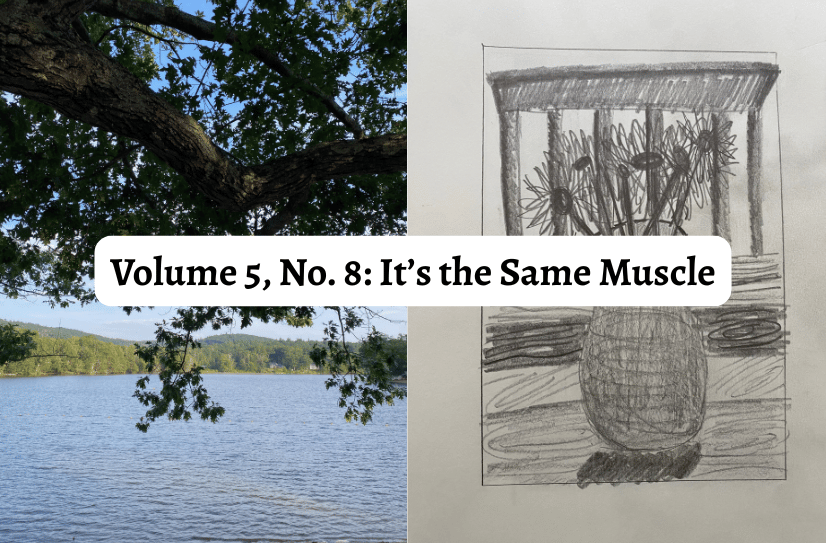
In this issue...
Current & Recent Reads
I have this stack of books that I’ve been “reading” for months. By “reading” I mean I read one or two pages of them a long time ago, and since then I’ve been carrying them around as if…holding a book to my chest is the same as reading it? They’re all 40×40 books, which means they are all books I really want to read, but, for various reasons (brain exhaustion, brain excitement, summer, indecision, writing instead of reading, inability to concentrate…), I keep putting them aside.

However, August is two days away and that means the Sealey Challenge is almost here! I have this overwhelming desire to begin the month with a clean slate. I’m going to be reading a poetry collection a day, writing a research paper, and doing 15-minute daily sketches. It’s a lot! I do not want to carry this stack into August. I have this vision of, come Friday, having a currently-reading stack of just two books! in addition to my daily poetry collection, one fiction and one nonfiction. I know this sounds Very Normal to most of you but it’s not how my maximalist brain generally rolls. It’s apparently what I need right now, though, so I’m going for it.
This week I finished two of the books in my stack: Gold and the Graywolf anthology Raised by Wolves. I don’t even know how to talk about how much I loved Gold (though I try, below). I also adored Raised by Wolves. I finally got past the first page of Lolly Willowes by Sylvia Townsend Warner and WOW I’m into it! I’m already more than halfway done. I’ve also returned to Jules Gill-Peterson’s A Short History of Trans Misogyny, which is brilliant. The final book in my lingering stack is American Indian Stories by Zitkála-Šá, which I plan to delve into as soon as I finish Lolly Willowes. These are all relatively short books, and I’m feeling excited and optimistic about finishing them by the end of the week.
Gold by Rumi, translated by Haleh Liza Gafori (2022)
I have, of course, read bits and pieces of Rumi before. But I’d never read a whole book of his poems, and I also did not know anything about him beyond the basics: super famous Persian poet, wrote about love. I did not know that his life was utterly changed by his friendship with the mystic and free-thinker Shams of Tabriz. Before meeting Shams, Rumi was an Islamic theologian in the tradition of his family—famous, respected, sober. After meeting Shams, he became a Sufi mystic and ecstatic poet. In her introduction, Gafori writes, “Shams broke Rumi open.” Then, two and a half years after they met, Shams died. So Rumi was broken open by love and by grief.

I don’t know how to write about these poems. How is it possible that these translated poems, written 800-ish years ago, can pierce me so completely, so sweetly? I want to declare that this is a book of queer love poems—queer expansively, love expansively, queer love poems as in: these are poems that name love outside of language, that revel in the divine that is human, the human that is divine. I hesitate to do so, because who am I to use any kind of contemporary English language for this ancient Persian poet?
All I know is that these poems are about what it feels like to love a person, are about the wildness of love, the wildness of heartbreak, they are the twining of love and grief. All I know is that these poems are earnestness as form. They are full of the too-muchness of the world. They overflow with the uncontainable ecstasy of being alive, which is is sometimes unbearable. The relationship at the center of these poems sings. It is not hidden. Reading these lines I felt so many years on my skin. This book is an invitation into mystery, to let mystery fill you. An invitation to let go of thought and enter instead, maybe, Aracelis Girmay’s “kingdom of touching.” The entire book is an ars poetica.
This book lodged itself so deeply inside me. What beautiful, shimmering translations. I can’t stop thinking about this one line from Martyr!: “Love was a room that appeared when you stepped into it.” These poems are the room.
Raised by Wolves: 50 Poets on 50 Poems edited by Graywolf Press (2024)
In this gorgeous anthology, fifty Graywolf poets write little odes to poems they love by other Graywolf poets. Many of these poets and poems are beloved to me. Others I had never read. In both cases, I adored these windows into poetic lineage and language.
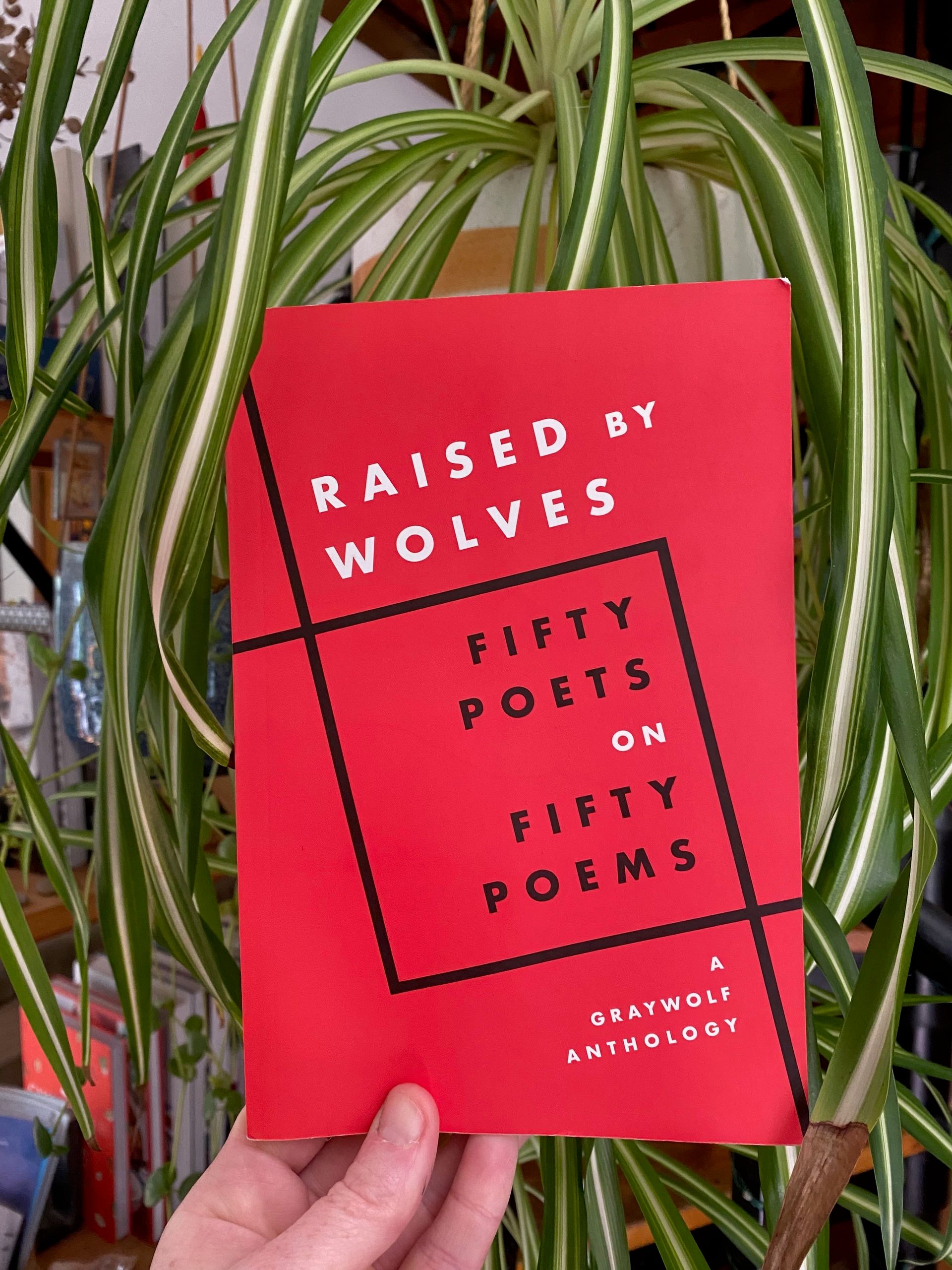
You probably know by now that I cannot shut up about how poetry is connective tissue, how being a poet is dependent on being among other poets, how all poems are conversations. I think this has been true forever, since the beginning of poetry. This anthology is an ode to that truth. Carl Phillips on Danez Smith, Danez Smith on Donika Kelly, Donika Kelly on Natasha Trethewey. It goes on and on. There’s the pleasure of getting to watch a poet close read a poem they love, muse on syntax and line breaks, reflect on some of what the poem did to them. And then there’s the other pleasure of getting to see all the threads of poetic lineags on the page. Who is made by who? Who is indebted to who? Where does a poet come from?
In some cases, these poets are writing about the people who made them possible, who showed them the way, like Eduardo C. Corral on James White. In some cases, they’re writing about poets they respect or admire, or who work in the same registers as them, like Layli Long Soldier on Solmaz Sharif. And in some cases they’re writing about the poets who have come after them, like Carl Phillips writing on Danez Smith.
The book moves through all of these beautiful, tangled webs of relation. It’s an ode to the words and work that change us, make us, shape us. It’s an endless and circular conversation. I loved reading the poems themselves. I loved reading the mini essays, which often showed me something I hadn’t seen in a poem I loved, or gave me a doorway into a poem I’d never read. But most of all I love the ethos of this project: we cannot make art without each other.
School Notebooks: My Sketchbook Practice
So what’s happened is that I’ve fallen in love with keeping a sketchbook.
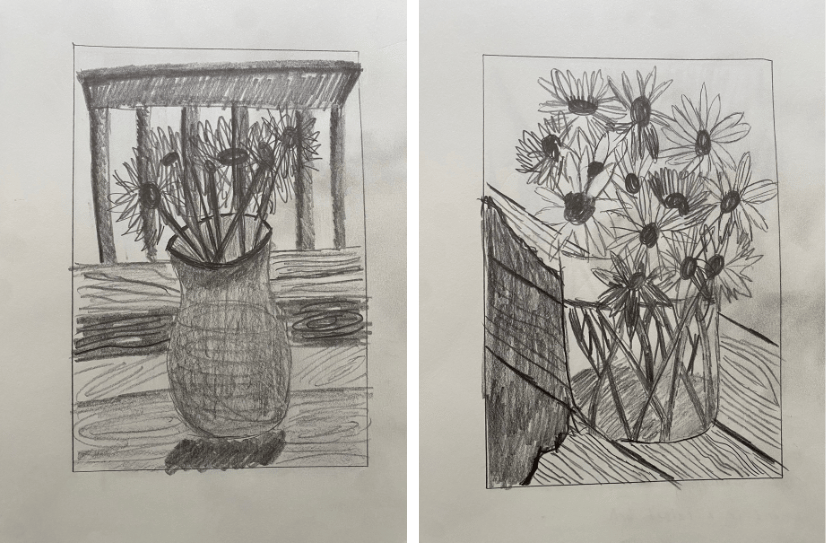
Two sketches of one of my favorite flowers, rudbeckia (black-eyed susan).
Every day, I open my sketchbook and set my timer for fifteen minutes. Sometimes I do it at the lake in the morning, before swimming. Sometimes I do it in the evenings, or during my lunch break. Last week I sat down under the pavilion at the community garden and drew the jar of flowers I’d just harvested. I’m not precious about what I draw. I just draw what’s in front of me. For fifteen minutes.
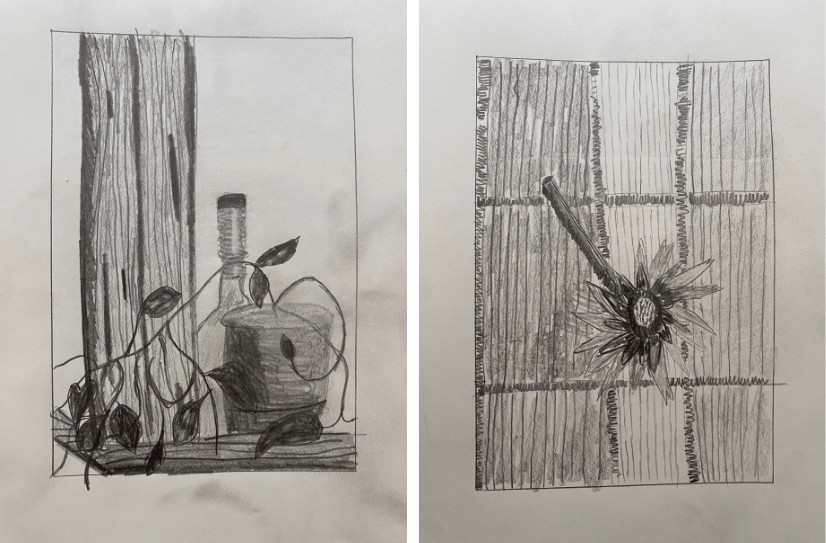
Sketches of a jar and a plant on my counter, and a rudbeckia stem on a placemat.
The sketches aren’t good. Or, rather—I think some of them are good, for me. I can feel myself getting better (very slowly) at translating what I see onto the page. But I don’t actually care what the sketches look like. What I love is this sustained practice of looking, of paying attention, of drawing what I see, and of continuing to look even when it feels like there is nothing more to add.
I’m used to doing this with words. I’m used to repeating a line aloud over and over again, turning over each word, seeking out its music. I’m used to spending minutes, hours, whole days, with a single stanza. I’m used to looking at and listening to poems closely. But I have never turned this kind of sustained attention to drawing. I’ve never bothered to sit still for fifteen whole minutes (it honestly feels like forever) and draw what I see. I can feel the way it’s changing me. I can feel the way it is slowing me down. It feels incredible.
The Connecticut River
So, I cheated a little bit by starting a new nonfiction book even though I’m not done with everything in my lingering stack, but also I’m in charge so it’s not really cheating. Anyway, the book is A Field Guide to the Connecticut River by Patrick J. Lynch. It’s another 40×40 book and it’s also exactly what it sounds like: a field guide to the Connecticut.
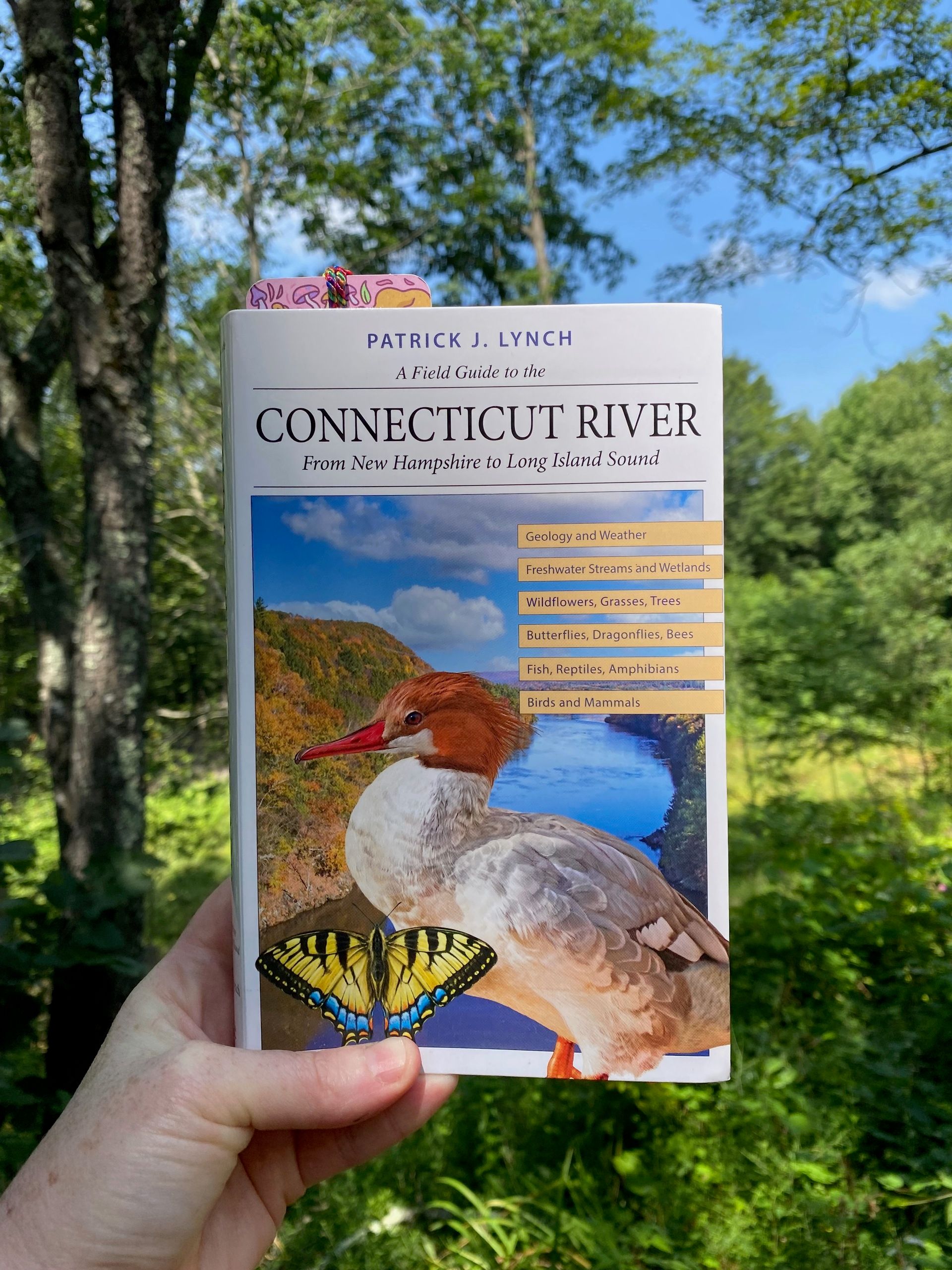
I live in the Connecticut River watershed. The river defines so much of my life. It’s also New England’s biggest river and has had a huge impact on the human, environmental, and ecological history of the region. I spend a lot of time thinking about rivers in general and the Connecticut in particular. I drive over it at least once a week, usually more. Whenever I drive over the huge dam in Great Falls, I think about all the ways we’ve damaged the river, about what it would look like to repair our relationship with this wild, ancient being (doing away with all the dams, for starters).
The book is so good. It took me a few days just to read the introduction, which is a series of photographs of various locations on the river, all marked on a map of the river’s course. I had to keep looking things up as I read, and now I’m planning various pilgrimages. I want to visit the headwaters of the Connecticut (a little marshy lake on the Canada/New Hampshire border called the Fourth Connecticut Lake) and also the mouth of the river and its estuary in Old Saybrook, Connecticut. I learned via the guidebook about tree swallow cruises that leave from the Connecticut River Museum and obviously I want to go on one of those. Now I’m reading about the geological history of the river and I’m taking it slow because I want to soak it all up.
Sealey Challenge Fundraiser for The Sameer Project
Open Books: A Poetry Emporium (a bucket list bookstore!) is generally rad and this year they are hosting a fundraiser for The Sameer Project during the Sealey Challenge! They’re encouraging folks doing the challenge (that’s me! and some of you!) to invite their communities (that’s you!) to pledge to donate on their behalf.
I will be reading a poetry collection every day in August. I’d love to raise $500 for The Sameer Project during that time. I’m personally pledging to donate $25. Here’s how you can join me:
Fill out this form to make a pledge. Make sure to put my name down as the person you’re sponsoring. At the end of the month, you’ll receive an email from Open Books letting you know I’ve completed the challenge and inviting you to complete your contribution.
Donate right now (or at any time during the challenge—don’t worry, I’ll keep reminding you!) using this link. Be sure to include a note at check-out noting that you’re sponsoring me.
If you make a pledge or an immediate donation, feel free to let me know (reply to this email or DM me on IG) so that I can keep track of our progress throughout the month!
Here’s some more information from Open Books about the work The Sameer Project is doing in Gaza.
Good Words: Don’t Believe the Bad Press About Human Beings
I highly recommend that you pause what you’re doing and read Mariame Kaba’s recent newsletter on the magic of showing up. I found the two stories she shared incredibly moving and instructive. I also appreciate and feel these words deep in my bones:
A few days ago, a good friend told me that it feels increasingly lonely to expect more of the world. I’ve been thinking about why I don’t feel the same way. I expect a lot more of the world and think that many others do too. It’s probably because I am surrounded by so many activists and organizers that I do not believe the bad press about human beings. I know that over and over again some human beings disappoint but I also know that over and over again other human beings show up to do their best. Those are stories worth embracing and uplifting alongside the horrors.
I love this sentence: “I do not believe the bad press about human beings.” This statement is not in willful ignorance of the evil humans are capable of. It is not in willful ignorance of every ongoing evil wrought by human hands. It is also, crucially, not in willful ignorance of every beautiful thing humans have made, every human act of bravery and love, all the ongoing ways humans take care of each other.
Maybe you’ll join me in becoming a monthly supporter of Mariame Kaba’s Giving Circle. I love what she has to say about it: “In lieu of monetizing my monthly newsletter on Substack, I have launched a giving circle to donate on a monthly basis to local mutual aid groups and efforts. My hope is that people who have pledged to contribute to the newsletter and those who want to support local mutual aid efforts will donate to the giving circle.”
Wonder & Care
I know that most of you aren’t local to the Valley but I’m going to highlight some upcoming Valley things anyway. These days I’m feeling drawn to getting out in my community. This isn’t necessarily easy for me—I’m an introvert!—and also, building intimacy and making connections requires a lot more than just showing up at events. But showing up is a place to start.
Smack Dab Queer Open Mic: Some folks I know are starting a monthly queer open mic at the LAVA Center in Greenfield. The first one is this Friday, August 1, signups at 6:30, open mic at 7pm. I’m gonna be there, maybe I’ll see you!
The 12th Annual Pocumtuck Homelands Festival is coming up this weekend, August 2nd and 3rd!
Great Falls Books Through Bars and Liyang Western Mass are holding an educational workshop and letter-writing event in solidarity with political prisoners in the Philippines on Friday August 7th at the Finders Collective in Great Falls.
As always, a little bit of beauty to send you on your way: It’s a good blueberry year on the ridge. Last week Nessa and I spent an evening meandering through the blueberry barrens in the golden light. I picked berries; she rolled around in the scrub and sniffed things. My love for this place is beyond words.
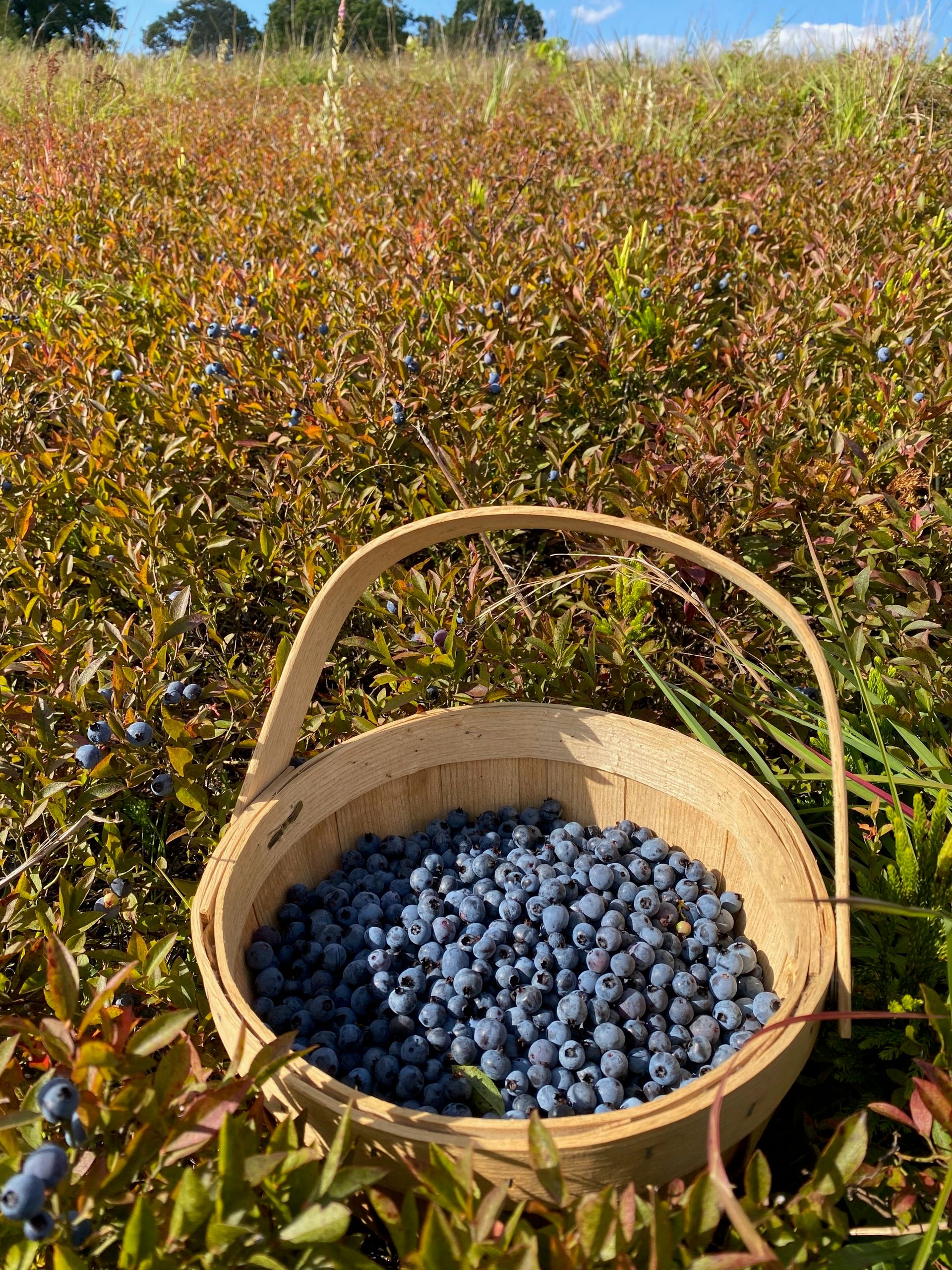
As we were leaving, our basket full, we passed other people arriving on the ridge: an older couple with a cardboard flat full of yogurt containers, a family with two young kids, one of whom was carrying a huge stack of baskets. On the ridge, there are blueberries practically as far as you can see, carpeting the hillside. There’s plenty for everyone. What sweetness, to share this abundance with strangers, with friends in the form of blueberry cake, with bears.
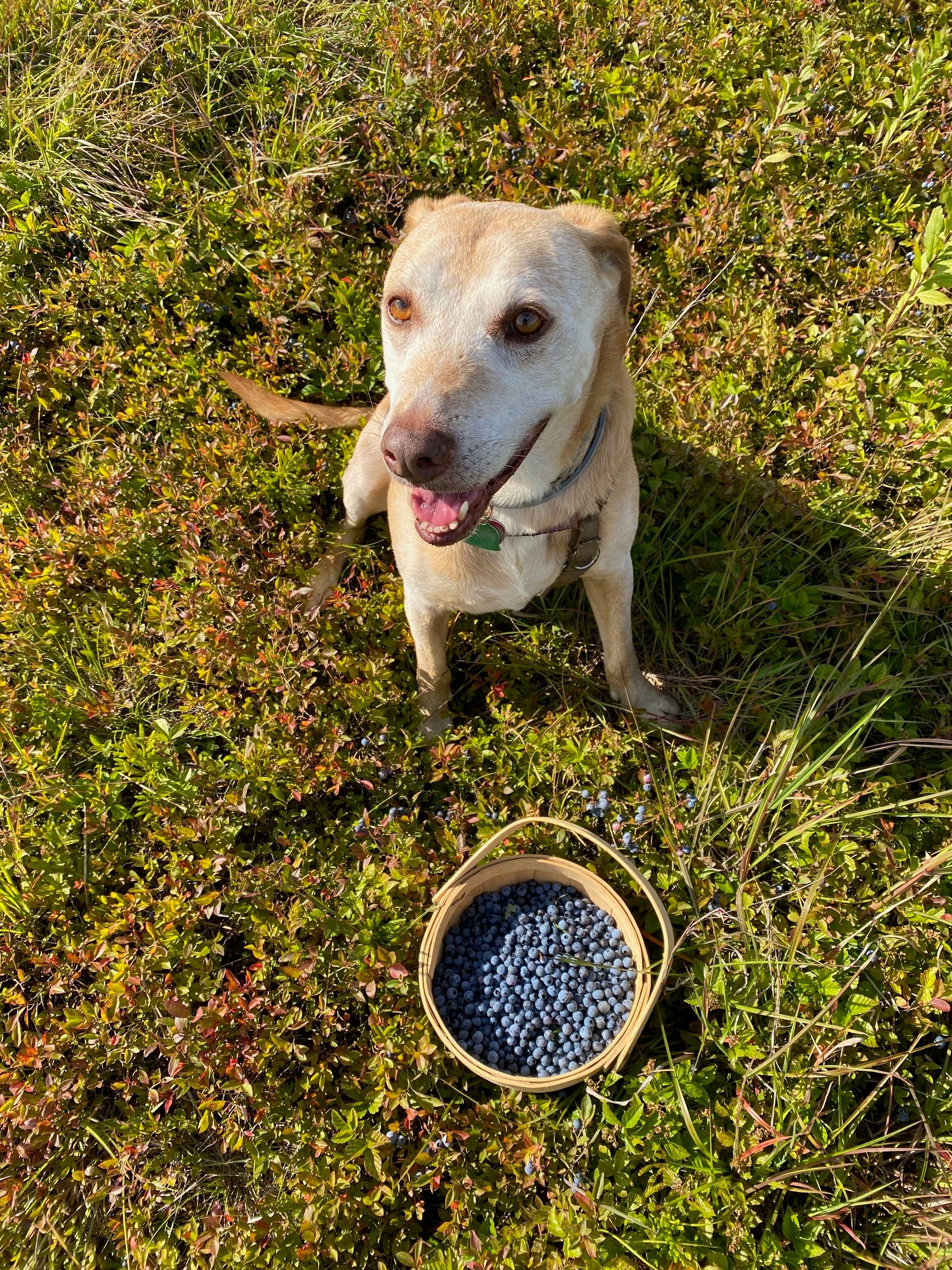
Don’t let this perfect face fool you—Nessa did not pick one single berry (she’s forgiven, though).
This is the blueberry cake I made, by the way. I recommend it.
Thanks, as always, for reading. Come give me some good press about human beings in the comments!
Reply